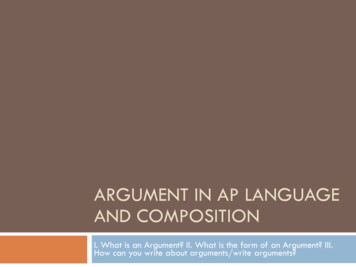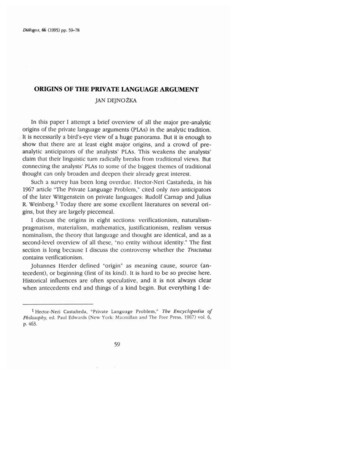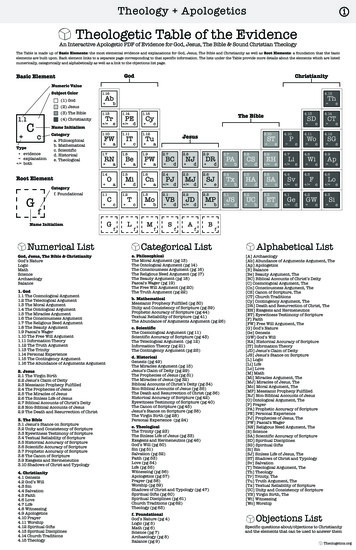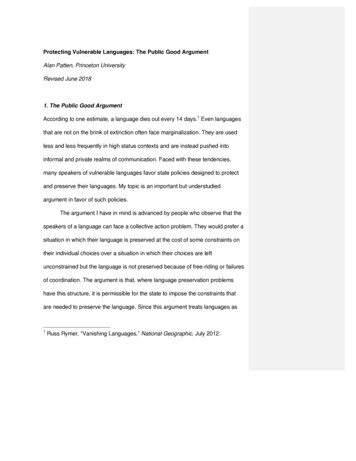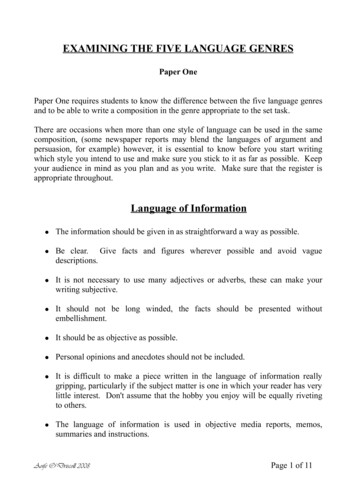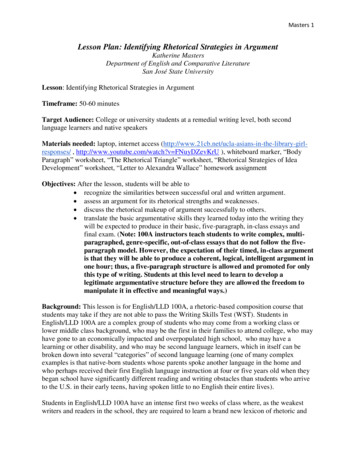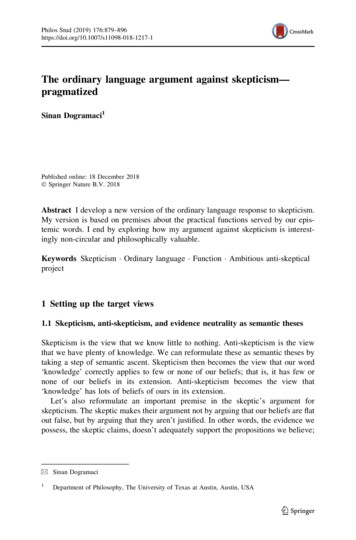
Transcription
Philos Stud (2019) 17-1The ordinary language argument against skepticism—pragmatizedSinan Dogramaci1Published online: 18 December 2018 Springer Nature B.V. 2018Abstract I develop a new version of the ordinary language response to skepticism.My version is based on premises about the practical functions served by our epistemic words. I end by exploring how my argument against skepticism is interestingly non-circular and philosophically valuable.Keywords Skepticism Ordinary language Function Ambitious anti-skepticalproject1 Setting up the target views1.1 Skepticism, anti-skepticism, and evidence neutrality as semantic thesesSkepticism is the view that we know little to nothing. Anti-skepticism is the viewthat we have plenty of knowledge. We can reformulate these as semantic theses bytaking a step of semantic ascent. Skepticism then becomes the view that our word‘knowledge’ correctly applies to few or none of our beliefs; that is, it has few ornone of our beliefs in its extension. Anti-skepticism becomes the view that‘knowledge’ has lots of beliefs of ours in its extension.Let’s also reformulate an important premise in the skeptic’s argument forskepticism. The skeptic makes their argument not by arguing that our beliefs are flatout false, but by arguing that they aren’t justified. In other words, the evidence wepossess, the skeptic claims, doesn’t adequately support the propositions we believe;& Sinan Dogramaci1Department of Philosophy, The University of Texas at Austin, Austin, USA123
880S. Dogramacior in yet other words, our evidence doesn’t make the things we believe very likely tobe true. Different arguments for skepticism share a key premise of evidenceneutrality. The premise says that all the evidence we have, or could ever obtain,lends no more support to our ordinary beliefs than it lends to various skepticalhypotheses that compete with our ordinary beliefs, such as that we’re brains in a vat,that other people are mindless zombies, or that the laws of nature will suddenlybreak down.1 The skeptic concludes that any evidence we have or could ever getwill leave our ordinary beliefs at least as likely false as true. Since knowledgerequires justification, indeed requires that what we believe is at least very likely trueif not surely true, the conclusion that we can know little to nothing also follows.Semantically reformulated, the skeptic’s evidence neutrality premise becomes apremise about the extension of a relation, the x-is-good-evidence-for-y relation. Theextension here consists of ordered pairs. The first member, x, is a body of evidence.(When we think of x as the evidence a person possesses, we’ll understand this to bethe person’s total evidence. The reason: if only a part of a person’s evidence makesa proposition likely, it might still be false that the person has justification to believethat proposition.) The second member, y, is a proposition, a hypothesis whoselikelihood is in question. To make the vague notion of ‘‘good evidence’’ morespecific, we can focus in particular on the relation where the total evidence, x, makesthe hypothesis proposition, y, more likely than not. Then evidence neutrality, thekey premise of the skeptic’s argument, says this: the x-is-good-evidence-fory relation does not contain in it pairings of (x) evidence that we actually or couldpossess paired with (y) very many, if any, of the ordinary propositions we believe.The anti-skeptic, who denies evidence neutrality, then must endorse thefollowing semantic reformulation of the premise’s denial. The anti-skeptic endorsesthis: the words that we use (interchangeably) to express epistemic evaluations,‘justifies’, ‘supports’, ‘makes likely’, and ‘is evidence favoring’, have an antiskeptical extension, that is, they include in their extension lots of ordered pairings of(x) evidence we do or could possess, paired together with (y) ordinary propositionswe believe.1.2 Immediate benefits of giving semantic formulationsWhat use is it to entertain all these semantic formulations of skepticism, antiskepticism, and evidence neutrality? I want to suggest that, even before we considerany arguments, just by turning our attention to the semantic formulations, we’vemade it easier to wholeheartedly embrace anti-skepticism. The point I want to makeright now is a psychological point. I think it’s simply a lot easier, psychologically, toappreciate how anti-skepticism could be true when we formulate it semantically. Allit takes for anti-skepticism to be true is for our epistemic terms to have picked upanti-skeptical extensions. For example, ‘supports’ just needs to contain in itsextension pairings of (x) evidence we do, or could, possess and (y) lots of ordinary1See, e.g. the discussions by Pryor (2000) and White (2006). On the ‘‘could ever obtain’’ aspect of theargument, see esp. Pryor’s pp. 528–531 and material he builds on in Stroud (1984).123
The ordinary language argument against skepticism 881propositions, like that I have hands and that the sun will rise tomorrow. Our otherepistemic terms, including ‘evidence’, also need the appropriate anti-skepticalextensions. Sure, maybe it could be that we’ve ended up using words with skepticalextensions, but, equally surely it would seem, it could be that we are, and have beenall along, using our words with anti-skeptical extensions. Why not? Can’t somewords have anti-skeptical extensions, and why can’t our words have them? Theskeptic does aim to argue that their view is necessarily true, in a metaphysical sense.The skeptic argues that, for creatures like us, no metaphysically possible evidencecould justify our ordinary beliefs. But that necessity depends on it being actuallytrue that our words have skeptical extensions. And that alleged actuality is madeespecially questionable when we think about the possibilities where our words haveanti-skeptical extensions.So, the mere existence of anti-skeptical extensions for our epistemic terms isuseful to know about. But I haven’t provided a detailed example of such anextension yet. Is there a worry that such extensions don’t even exist? I don’t thinkso. The worry would have to be that there is no consistent characterization of acandidate anti-skeptical extension for our epistemic terms; in figurative language,such extensions aren’t even stocked on the shelf in Plato’s heaven. This sort ofworry certainly has force for other philosophically contested notions. The deepchallenge for ‘true’, and the concept of truth, in light of the Liar paradox, is thatattempts to characterize their extension run into inconsistency. It thus takes hardwork to even make it plausible that there’s a coherent candidate extension for ‘true’.But our epistemic terms don’t face such a challenge. That’s because the traditionalskeptical arguments are not arguments that there is no possible candidate antiskeptical extension for ‘justified’ or ‘knows’. The skeptics didn’t argue that there isno abstract object in Plato’s heaven that both is anti-skeptical and could remotelyreasonably turn out to be the extension of ‘knows’. And we do have good examplesof reasonable such candidate extensions. The examples are the extensions that comewith existing anti-skeptical theories, like dogmatism, neo-rationalism, and the anticlosure view.2 When I call these extensions ‘‘candidates’’, I mean they look likeextensions one of which reasonably might turn out to be our epistemic terms’extension, given our actual usage. It’s reasonable to think philosophical examinationand reflection might ultimately lead us, maybe after we’ve achieved wide reflectiveequilibrium, to conclude, for one of these, that it’s the actual extension. In thatsense, I think we have good candidate anti-skeptical extensions available on theshelf, in Plato’s heaven, for our epistemic terms. And this is my optimistic startingpoint from which I want to argue that one or the other of these is the actualextension.2See Pryor (2000) for dogmatism; see Wright (2004) and White (2006) for neo-rationalism; see Dretske(1970) for anti-closure.123
882S. Dogramaci2 Arguing for anti-skepticism via the pragmatics of languageSo now let’s try to argue for anti-skepticism. We’ll take the semantic formulation asour targeted conclusion. We’ll argue that our epistemic terms, ‘knows’ and‘supports’ and the rest, actually have anti-skeptical extensions.I’m following in the tradition of the so-called ordinary language school, whoseanti-skeptical proponents included Malcolm, Austin, and Strawson.3 I’ll be pursuingan argumentative strategy of my own, so I won’t examine their particular views andarguments (or lack of arguments, actually) (and I’ll relegate my response to anunjustly influential objection from Salmon to a footnote.4).My proposed strategy is to begin with premises about the pragmatics of ourepistemic terms, and using these premises make an argument for anti-skepticism,semantically formulated, as our conclusion. These premises I’ll borrow from otherwork. The main step forward I want to take and defend here is to propose apragmatics-to-semantics link, and to show how, given that link as a plausible furtherpremise, anti-skepticism follows. But first, let me state those starting premises aboutthe pragmatics of our epistemic terms.2.1 Pragmatics of our epistemic termsI use ‘pragmatics’ to mean views about what function our epistemic terms serve,what point or purpose they serve. I’m not using ‘pragmatics’, as many philosophersof language do, to mean views about how words can communicate information thatdiffers from their semantic content. My use is more in the spirit of pragmatism, thephilosophical tradition.5So then, what function, or functions, do our epistemic terms serve? We shouldn’tbe satisfied with as simple an answer as that we use our words like ‘knows’ and‘rational’ in order to refer to knowledge and rational belief. There is a plenitude ofthings and properties that we could have adopted a word or concept to make specificreference to, but as limited creatures we adopt words and concepts for only some ofthem. So, something more must be said if we’re to explain why we use certainwords and concepts rather than others. The explanation might be fairly simple andapparent for words like ‘water’, ‘venomous’, ‘tiger’, or ‘Napoleon’: clearly itbenefits us to be able to think and communicate about such things. But it is3See Malcolm (1942), Austin (1946/1961), and Strawson (1952, ch. 9). For useful discussions, see,respectively, Soames (2003, ch. 7), Kaplan (2008), and Avnur (ms.).4The objection: who cares if you can, or if we did, make up some word that congratulates people whoform certain beliefs on the basis of certain evidence? [See Salmon (1957, pp. 39–42).]. The response: ifour analysis is correct, it’s not just an analysis of some or other congratulatory term. It’s an analysis ofwhen a belief is likely true, and we care about that. For, being justified/rational/reasonable just is beinglikely true. (This is what’s called epistemic or evidential probability. It’s not objective chance, the kindfound in quantum mechanics—though the two are linked via the Principal Principle.).5See, e.g. Hookway (2016). The pragmatist tradition has many threads, but I only follow one narrowaspect of it all, namely the idea that Hookway reports like this: ‘All pragmatists have held that thecontent of a thought or judgment is a matter of the role it fills in our activities of inquiry. The content of athought or belief is to be explained by reference to what we do with it or how we interpret it.’ (Sec. 4.4).123
The ordinary language argument against skepticism 883distinctively puzzling why we talk and think about things like knowledge andrationality. An adequate pragmatics must explain why we use these words andconcepts (these puzzles are further explored and addressed in the literature that I’llrely on here.6).I want to endorse each of three different views about the pragmatics of ourepistemic terms. The views are mutually compatible because our epistemic termscan, and plausibly do, serve all of these multiple functions. This will eventually giveus three distinct arguments for anti-skepticism.(1) The first view comes from Edward Craig.7 Craig’s view wasn’t widelynoticed at the time of its publication, but as people are hearing about it they arequickly appreciating it and recently the view has become fairly popular. It’s beendeveloped, elaborated, and given new applications by many authors.8 Craig’s viewis that the function of knowledge attributions is to identify, and publicly flag,sources of trustworthy testimony.It’s a fairly intuitive and plausible idea. Our own individual means of collectinginformation are limited; our own eyes, ears, and reasoning give us only so muchinformation. So, we want to learn more from the eyes, ears, and reasoning of others.But if we gullibly trust just anyone, we’re at risk of getting false beliefs. By usingknowledge attributions, Craig proposes, we can judiciously sort the trustworthytruth tellers from the rest. The trustworthy sources earn our attribution of knowledgeby displaying to us, over time, easily detectible signs of their reliability.The knowledgable testimony they offer is usually specific to a topic of expertise,and it is most usefully and commonly attributed in the form of S-knows-about-topict, or S-knows-whether-or-not-p, rather than (the philosopher’s favorite form) Sknows-that-p (which is often redundant to attributors interested in whether-p). Forexample, if I want information about whether there is a gas station nearby, or justwhat is nearby, you might tell me to ask the locals, the ones who know whether ornot there is. When we want information about medical matters we ask the doctorwho knows, when we want to know about math we ask the mathematician whoknows, when we want to know what’s on the menu tonight we ask the chef or thewaiter who knows, and so on. When I need certain information, learning who hasbeen flagged as a knowledgable testifier on the matter brings me one step away fromthe information itself.(2) The second view about the function of our epistemic terms is one that I’veproposed and for which I suggested the name ‘epistemic communism’.9 LikeCraig’s view, epistemic communism says that we use epistemically evaluativelanguage in order to make the testimony we rely on trustworthy, that is, safe forconsumption. Whereas Craig proposes that we use knowledge attributions toidentify trustworthy testifiers, communism adds the proposal that our epistemic6See in particular Dogramaci (2012) for why our use of epistemic evaluation is puzzling.7Craig (1990).8See, e.g. Fricker (2007, chs. 5–6), Henderson (2011), Reynolds (2017), Greco and Hedden (2016), andHannon (forthcoming).9See Dogramaci (2012, 2015a, b).123
884S. Dogramacievaluations also have the effect of influencing others to use the same basic beliefforming methods. We apply negative epistemic evaluations when a testifier is foundto have used, whether by a failure in competence or performance, an untrustworthybelief-forming method, perhaps forming a belief by wishful thinking or rushing tojudgment or stubbornly refusing to respond to the piled up evidence. By criticizingbeliefs as irrational, we derivatively criticize the believer’s method, and therebydiscourage such poor performance. Likewise, our positive evaluations can reinforcemethods that we are eager to see more use of.When we all form beliefs by using the same basic methods, the benefit is that atestifier’s report is then automatically trustworthy. Your testimony is as trustworthyas my own eyes and ears and my own reasoning. This coordination of basic methodsis an efficient way of making testimony trustworthy. If a testifier uses an exoticmethod, it would be unsafe to trust their testimony until the audience has vetted themethod as reliable, but vetting is costly and can also leave the testimony redundant.By coordinating, we can each collect more true beliefs while safely handing off toothers some of the work of collecting evidence and reasoning.Craig and I, together, then, propose how our epistemic language (both knowledgeattributions and the entailed, or separately issued, justification attributions) makestestimony safe for consumption, efficiently minimizing the risk of gullibly buyingfalse testimony.(3) The third view about the function of our epistemic terms, this one againfocused, like Craig’s, just on ‘knows’, has been influentially defended by TimothyWilliamson. The view is that knowledge attributions play an important role in theexplanation of behavior.Williamson’s view is a variant of a traditional functionalist view. The traditionalview is that our actions are causally explained by our beliefs and desires: our beliefsand desires cause us to take actions that would fulfill those desires if those beliefswere true, and thus our successful actions are often explained by our having truebeliefs. Williamson argues that the best explanation of some behaviors must appealto the person’s knowing this or that, rather than merely believing or even trulybelieving it. He argues that sometimes behavior that is successful, or desirefulfilling, in a more reliably robust and systematic way, over an extended time, isbetter explained by knowledge rather than mere true belief. Hilary Kornblith andJennifer Nagel elaborate and defend the view as well.10In Williamson’s memorable example (p. 62), a burglar’s persistently searchinguntil he finds the hidden diamond may be best explained by his knowledge that thediamond is in the house. An attribution of mere true belief, it’s argued, doesn’t makefor as good an explanation. Positing mere true belief (botched knowledge, asWilliamson, p. 47, calls it) wouldn’t explain the burglar’s successful behavior nearlyso well.I find each of these three views plausible. They’re immediately attractive, andthey enjoy supportive arguments and defenses. But I leave most of that arguing anddefense to other work.10Williamson (2000, esp. secs. 2.4 and 3.4), Kornblith (2002, esp. sec. 2.6), and Nagel (2013).123
The ordinary language argument against skepticism 885I take each of these three views about functions to be teleological explanations ofwhy we use the words and concepts that we do (rather than the infinitely manyalternatives we don’t use). They are teleological because they explain why weadopted, or at least why we persist in, our practice by citing the practice’s beneficialeffects. Explaining a practice by citing its effects raises well known philosophicalconcerns, but I leave the general defense of the notion of teleology to others.11 (Imyself happily follow Millikan and Neander’s analysis of teleological explanationas explanation by selection, allowing both natural selection and cultural or artificialselection.) Our three explanations might be incomplete sketches; perhaps there is alarger story that integrates them into natural and cultural evolution. But even assketches they are still explanatorily illuminating.My main aim here is application.12 Taking these three views about pragmatics aspremises, I want to argue for anti-skepticism as a conclusion. The next sub-sectionproposes how to link those premises to that conclusion.2.2 Linking pragmatics to semanticsHow can we draw a link between the way we use words to fulfill a practical functionand what our words mean?I propose the following link between teleological explanations of our use ofwords, and the meanings those words have—a pragmatics to semantics link.[P-S] For those words that we can teleologically explain our use of, the fullteleological explanation must constrain the words’ contents such that, if thewords normally transmitted beliefs involving those contents, that wouldexplain how our actions serve the words’ posited function.The idea is that pragmatics, as understood here, has to constrain semantics. If ouruse of one or more words fulfills a function, then the means of doing so must appealto the meanings, the semantic contents, of those words. And the way semanticcontent figures in the explanation is via the way beliefs explain actions.I already brought up, earlier, some important views about how beliefs explainactions. The traditional functionalist says beliefs cause actions that would fulfill thebeliever’s desires if those beliefs were true. We saw that the functionalist andWilliamson disagree over whether mere true belief always best explains desirefulfilling action, but [P-S] is neutral over this dispute. [P-S] simply appeals to theplausible claim that all sides agree to, namely that different beliefs cause differentactions, and what makes that difference in belief is a difference in content.What can be said in support of [P-S]? I hope the general thesis looks plausible onits face. Let me take a paragraph to unpack the thesis a bit in a way that may further11A classic defense is Wright (1976). See Sober (2000, sec. 3.7) for a general expository discussion ofthe use of natural and artificial selection to give teleological explanations. See Millikan (1984), andNeander (1991) for highly plausible analyses of the notion of ‘having a function’ along the lines of‘having been selected for’.12A similar attempt to merely apply these ideas is the application to the uniqueness debate by Greco andHedden (2016) and Dogramaci and Horowitz (2016).123
886S. Dogramacibring out that plausibility. [P-S] concerns pragmatics, which consists in teleologicalexplanations of our use of language. Since these explanations are teleological, theymust appeal to the effects of language use. Those effects are actions caused by ouruse of language, actions that serve a function. This observation raises a question:can such a teleological explanation of our use of words be given withoutconstraining the meanings of those words at all? I don’t see how. I don’t see howlanguage use can cause those function-serving actions unless it’s partly by virtue ofthe used language having particular contents. Of course, our use of sounds (orwritten marks) can, sometimes, cause actions in a way that’s completelyindependent of any contents they might carry (e.g. I might get your attention byyelling), but then those sounds’ status as words, as language, is not any part of theexplanation of our behavior here. [P-S] concerns explanations of why we use certainwords, why we use language. In a teleological explanation of why we use certainwords, those uses are shown to serve a function, but we explain why we use thosewords (as opposed to just explaining why we make certain sounds) only if these usesare taken to be meaningful uses of language, that is, only if they cause us to act oneway or another partly because our sounds are carrying distinctive contents. What [PS] says is that if we employ certain words because they serve a certain function, thenwe serve that function by using those words meaningfully, using them as languageand not as mere sounds. Correctly understood, then, I think that [P-S] should bedenied only by those who are radical skeptics about content and its explanatorypower.Alongside those general reflections that I hope bring out its plausibility, [P-S]also gets strong support from case studies of meaningful communication. I think theclearest and most compelling examples are the signaling games that David Lewisfamously described and studied in his work on convention.13 What I borrow fromLewis is his compelling portrait of how, when sounds and marks are used togenerate a regularity in behavior that solves a game-theoretic coordination problem,then those sounds and marks intuitively have certain meanings. Those sounds andmarks become signals, as Lewis says.14Some of the most compelling examples of these signaling games are ones thatBrian Skyrms has explored.15 These are signaling games that naturally evolved insocial animals like monkeys, birds, and bees, and even among bacteria and algae.Like Lewis, Skyrms brings out how certain behaviors, initially described inthoroughly naturalistic terms, are intuitively meaningful, and furthermore possessspecific meanings that we can intuitively specify. In the famous signaling system of13See Lewis (1969, ch. 4).14As it’s put by Lewis (1969, pp. 124–125): ‘‘I have now described the character of a case of signalingwithout mentioning the meaning of the signals: that two lanterns meant that the redcoats were coming bysea, or whatever. But nothing important seems to have been left unsaid, so what has been said mustsomehow imply that the signals have their meaning.’’Caution! Lewis proposed to naturalize a representational activity, signaling, by reducing it to certainnon-representational facts about conventions, but he didn’t propose to naturalize language orrepresentational states more generally in this way. I likewise do not propose to naturalize language ormental representation by reducing it to conventions.15See Skyrms (2010).123
The ordinary language argument against skepticism 887honeybees, a scout finds a food source, returns to the hive, and performs the waggledance that signals to the hive the direction and distance of the food source.16 Inseveral monkey species, individuals use acoustically distinctive sounds as alarmcalls for distinct purposes. Most famously, this is the practice of the vervets studiedby Dorothy Cheney and Richard Seyfarth in the 1980s.17 When a vervet spots aneagle, a leopard, or a python, it emits a distinct alarm. The eagle alarm causeshearers to hide in the grass, the leopard alarm causes them to run up a tree, and thepython alarm causes the monkeys to stand tall and scan the surrounding grounds.These responses are the optimal defenses for each type of predator.It’s apparent to the ethologists studying them, and to anyone who hears the facts,that the different signals used by bees and vervets carry different meanings. Thedistance the scout bee waggles represents the distance to the food source; orientationrelative to the apex of the beehive represents direction relative to the sun. The threevervet alarms represent the three predators. The ethologists studying these animalssimply make the intuitive attributions, and readers all find the attributions plausible.What guides these intuitive attributions? We’re not conversing with these animals,of course. What enables us to make these attributions is the idea behind [P-S]: ifcertain signals are made because they serve certain functions, that constrains theirmeanings. Cheney and Seyfarth explicitly tell us this is their reasoning. ‘‘We havecalled the vocalizations of vervet monkeys semantic signals and have drawn ananalogy to human words because of the way these calls function in the monkeys’daily lives.’’18 While Lewis and Skyrms develop detailed theories about how suchsignals get their particular meanings, [P-S] only makes the fairly modest claim thatthe signals carry meanings, and cause beliefs in hearers, that, in virtue of theircontents, would explain how the participants serve the practical function thatexplains the persistence of the signaling system.I’m next going to argue for anti-skepticism using [P-S], but as we proceed, we’llneed to be cautious about the following: [P-S] doesn’t require that a word normallycommunicates true beliefs in order to fulfill its function. We need to consider, ineach case, whether the best teleological explanation of our practice has usconveying truths. We can defeasibly expect this to be case for most ordinary words,though. Consider a word like ‘water’. Its pragmatics are pretty clear, at least in veryrough outline. We use this word in order to be able to think and talk about abiologically very important substance, water. But we don’t just want any oldsentences or thoughts, we want true ones of course (and not only true, but alsorelevant to our current practical predicament). So, the full pragmatics, the fullteleological explanation of why we use ‘water’, will have it that, in fulfilling theword’s function, we do normally use it to communicate true beliefs. But it had betternot be that every word we can teleologically explain our use of is normally used toconvey truths. Our lives are filled with lies and myths. I don’t know exactly what16See von Frisch (1967); summarized by Skyrms (2010, p. 28).17See Cheney and Seyfarth (1990). Skyrms (2010, p. 22) lists several other monkey species.You can listen to the vervet alarm calls for yourself here: rvet-monkey-vocalizations/.18Cheney and Seyfarth (1990, p. 139), emphasis in original; see also chs. 1, 4–7.123
888S. Dogramacifunction our empty language for the supernatural serves, but it certainly seemspossible that it serves some function, maybe a biological evolutionary function,even if we don’t use the language to systematically speak truthfully. Some examplesof false signaling with a clear function are provided by animals. Beavers, somebirds, and some monkeys use alarm signals, but emit a false alarm more frequentlythan a true alarm (unlike most vervets).2.3 Our epistemic terms have anti-skeptical extensionsSuppose [P-S], and suppose any one of the three views of the pragmatics of ourepistemic terms that were sketched earlier. Then, I claim, anti-skepticism follows.Let me elaborate how so.Take, to begin with, Williamson’s explanatory function of knowledge attributions. Suppose it is true: we do use knowledge attributions because they allow us togive explanations. We use ‘knows’ because it allows us to explain why the burglarpersistently searched until he found the diamond. A teleological explanation ofsome word must connect the word’s use to some (somehow beneficial) effectedactions. And according to [P-S], that effected action is caused partly in virtue of thecontents of our explanations by knowledge attribution. What are these effectedactions? The ability to explain the past confers a more immediately useful ability topredict the future, and so
The ordinary language argument against skepticism— pragmatized Sinan Dogramaci1 Published online: 18 December 2018 Springer Nature B.V. 2018 Abstract I develop a new version of the ordinary language response to skepticism. My version is based on premises abou

